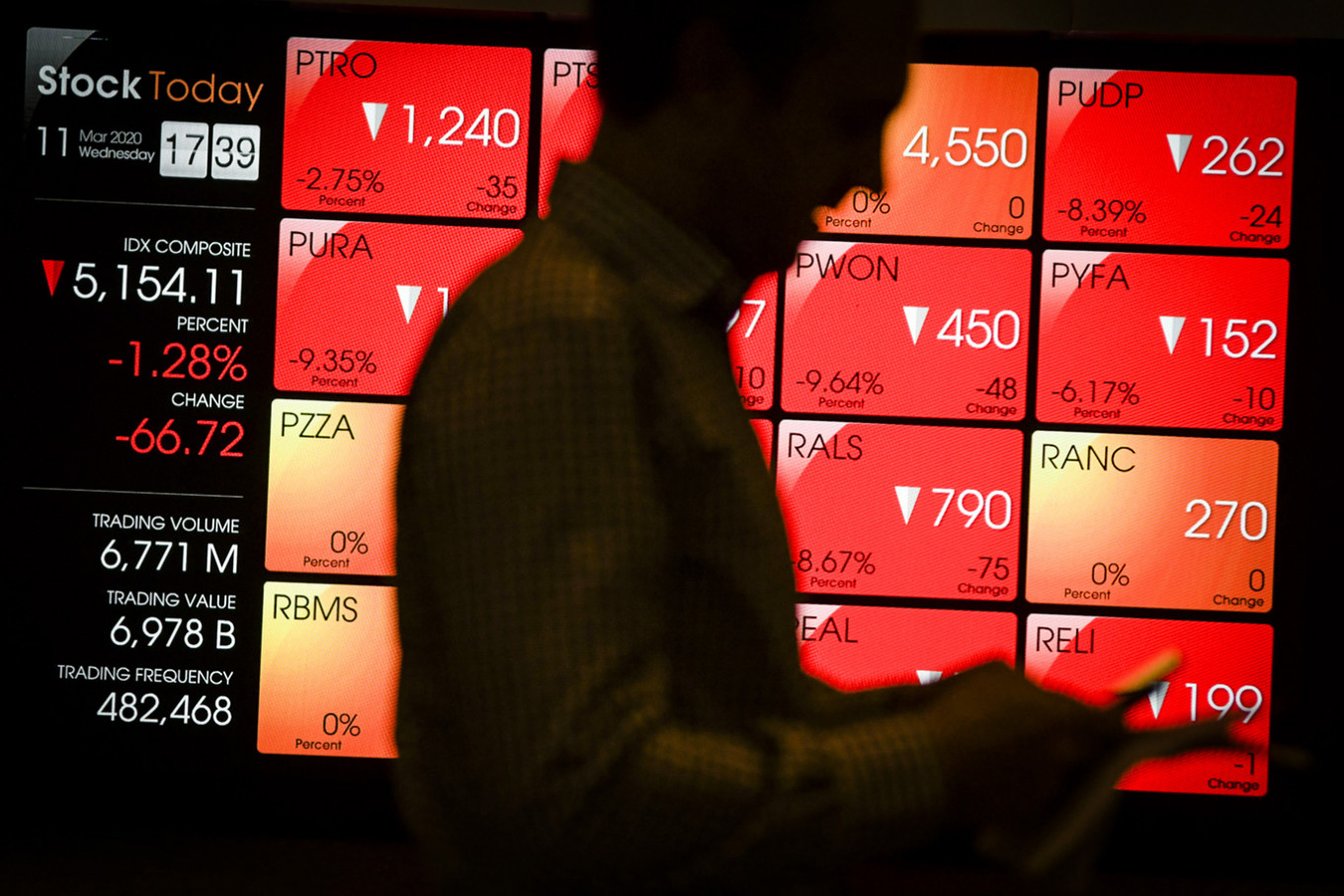Popular Reads
Top Results
Can't find what you're looking for?
View all search resultsPopular Reads
Top Results
Can't find what you're looking for?
View all search resultsTrading halted for first time since 2008 over pandemic
This is the first time the IDX suspended stock trading since the 2008 financial crisis.
Change text size
Gift Premium Articles
to Anyone
T
he Indonesia Stock Exchange (IDX) suspended equity trading 30 minutes before Thursday’s session ended as the main gauge dropped deeper than the bourse’s new auto rejection level to a figure unseen in almost four years.
The Jakarta Composite Index (JCI) crashed more than 5 percent to 4,895.75 amid a global market rout following the World Health Organization's declaration of COVID-19 as a pandemic.
“Stock trading was halted for 30 minutes, but because this occurred 30 minutes before the close of trading, trading is technically closed now,” said Fakhri Hilmi, deputy commissioner for capital market supervision at the Financial Services Authority (OJK). “Today has closed; it’s all done.”
This is the first time the IDX suspended stock trading since the 2008 financial crisis. On Oct. 8, 2008, the JCI free fell 10.38 percent to 1,451.67, prompting the bourse to halt trading for two days before resuming activity on Oct. 13.
On Thursday, foreign investors dumped Rp 256.6 billion (US$17.5 million) worth of stocks more than they bought, resulting in Rp 7.2 trillion of net sells so far this year. The index itself lost 22.28 percent of its value as of Thursday, the third-worst among its Southeast Asian peers after Thailand and the Philippines.
Circuit breakers were also triggered in Thailand and the Philippines after each of their benchmark gauges slumped 10 percent, the most in Asia, Bloomberg reported.
The rupiah exchange rate against the greenback depreciated by more than 1 percent to 14,552 on Thursday. Bank Indonesia recorded foreign outflows of Rp 31.76 trillion worth of government bonds and Rp 4.87 trillion worth of stocks so far this year as foreign investors flock to safe-haven assets.
The pneumonia-like illness has spread to hundreds of countries around the world, disrupting business activity in economic giants, such as China, the United States, Japan and South Korea.
Tokyo dropped 4.4 percent on Thursday, while Hong Kong fell 3.7 percent, Singapore plunged 3.8 percent. London fell deep in the red at 7.7 percent on early trading while S&P 500 futures on Wall Street indicated a 7-percent fall at the opening.
“[Market players] are concerned that the pandemic will disrupt the global supply chain and eventually slow global GDP [gross domestic product],” said Indonesia Equity Analyst Association (AAEI) chairman Edwin Sebayang on Thursday.
The IDX has been rolling out policies to anchor the index, which has been volatile in the past weeks.
On Monday, the IDX issued a new auto-rejection regulation that capped stock prices falling to a maximum of 10 percent for stocks at all price ranges from a variation of 20 percent to 35 percent depending on the price range. It also decided to temporarily halt short selling on Monday until further notice to help anchor the index.
On Tuesday evening, the bourse issued a new trading suspension regulation. It stipulates that the IDX will halt stock trading for 30 minutes if the main gauge falls by more than 5 percent.
If the index keeps falling to more than 10 percent after the first suspension is lifted, the bourse will halt trading for another 30 minutes. Trading will halt for the whole session if the JCI continues to plunge deeper than 15 percent.
Previously, the bourse only suspended trading when the index fell by 10 percent.
Analysts, however, said the new auto rejection policy did little to prevent the index from falling far deeper.
“It’s not effective. It instead adds panic to market players who probably think that tomorrow [Friday] the index will drop deeper so they conduct selling sprees,” said Panin Sekuritas equity analyst William Hartanto. He expected the JCI to move between 4,600 and 5,000 this month.
“It’s hard to predict where the bottom is,” said Trimegah Securities head of research and foreign institutional equity Sebastian Tobing. “Cash is king for now.”










